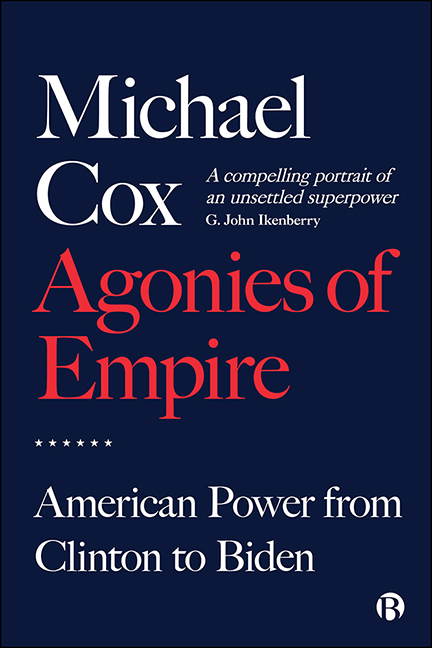Book contents
- Frontmatter
- Dedication
- Contents
- About the Author
- Preface
- Introduction: The Rise of an Empire
- PART I Clinton: Liberal Leviathan
- PART II Bush Jnr: Empire in an Age of Terror
- PART III Obama: Towards a Post-American World?
- PART IV Trump: Turbulence in the Age of Populism
- PART V Biden: Is America Back?
- Notes and References
- Acknowledgements
- Index
PART II - Bush Jnr: Empire in an Age of Terror
Published online by Cambridge University Press: 15 September 2022
- Frontmatter
- Dedication
- Contents
- About the Author
- Preface
- Introduction: The Rise of an Empire
- PART I Clinton: Liberal Leviathan
- PART II Bush Jnr: Empire in an Age of Terror
- PART III Obama: Towards a Post-American World?
- PART IV Trump: Turbulence in the Age of Populism
- PART V Biden: Is America Back?
- Notes and References
- Acknowledgements
- Index
Summary
When Clinton left office he was replaced by a very different kind of politician in the shape of George W. Bush, a conservative of limited intellect but from a very powerful Republican dynasty whose rise to the White House – via a Supreme Court decision following a long dispute as to what really happened in Florida during the 2000 election – was bizarre by any standards. As a Brookings report was later moved to observe, ‘no work of fiction could have plausibly captured’ the many ‘twists and turns’ which finally led to Bush becoming president. Nor of course could anybody have anticipated what happened a few months later when on September 11 four planes acting as flying bombs not only killed close to three thousand people but completely changed the direction of US foreign policy. Though initially inclined to view the world in classically realist terms in which states were the primary actors, with the attack launched by a non-state actor espousing an ideology inspired by a particular reading of Islam, everything changed. It also allowed those around Bush (known in popular parlance as ‘neo-cons’) to articulate a decidedly expansive – even ‘imperial’ – strategy to deal with what they believed was the profound crisis facing the Middle East. America, they insisted had been a long liberal ‘holiday from history’, and if nothing else 9/11 was a stark reminder that the world was a very hostile place harbouring all sorts of very dangerous people and states. Certainly, sitting back and waiting was no longer an option. As the late Donald Rumsfeld put it, using an American footballing analogy, in a world of unknown unknowns ‘the best, and in some cases the only, defence is a good offence’. To see how this offensive translated into action, I focus in the two chapters which follow on the links between 9/11 and the Iraq War and explain how the Bush team exploited the crisis occasioned by the ‘Fall of the Towers’ in order to pursue a more ‘imperial’ foreign policy, and why this strategy was more likely to end in failure than success.
- Type
- Chapter
- Information
- Agonies of EmpireAmerican Power from Clinton to Biden, pp. 55 - 56Publisher: Bristol University PressPrint publication year: 2022



